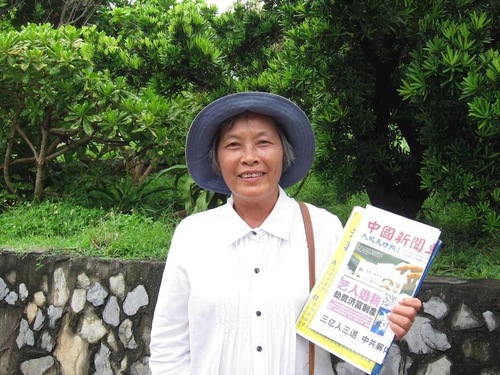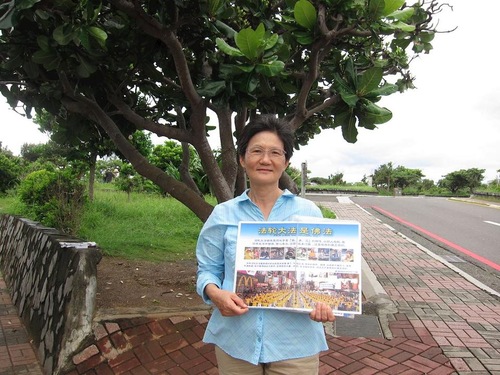(Minghui.org) (Continued from Part 11)
Tourists in the southernmost tip of Taiwan can always see Falun Gong practitioners in their signature yellow shirts, rain or shine.
Practitioners have handed out Falun Gong flyers in Eluanbi Park inside Kenting National Park for close to two decades. They introduce the meditation practice to the public and raise awareness of the persecution in China that has continued unceasingly since 1999.
Along the path to the famous Eluanbi Lighthouse, tourists can see posters about the persecution and practitioners demonstrating the Falun Gong exercises.
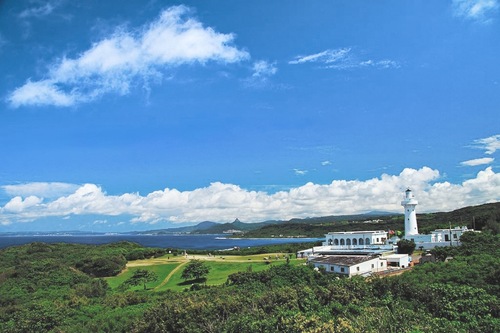 Eluanbi Lighthouse is located at the southernmost point of Taiwan. “Eluan” is an indigenous word for sailboat and “bi” means nose. Nearby is a reef rock shaped like a sailboat with the tip sticking out like a nose that forms the headland.
Eluanbi Lighthouse is located at the southernmost point of Taiwan. “Eluan” is an indigenous word for sailboat and “bi” means nose. Nearby is a reef rock shaped like a sailboat with the tip sticking out like a nose that forms the headland.
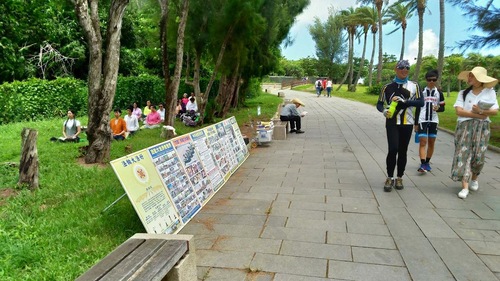
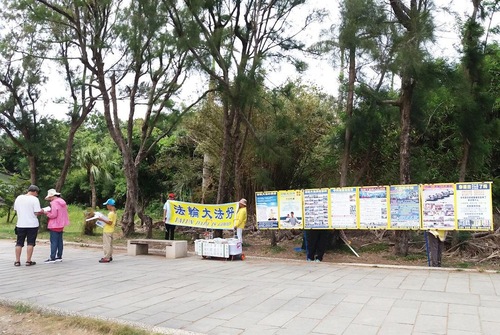 Falun Gong practitioners tell tourists in Eluanbi Park about the persecution in China.
Falun Gong practitioners tell tourists in Eluanbi Park about the persecution in China.
The Lighthouse in Eluanbi is one of the most visited sights in all of Taiwan. Because it produces the brightest light with the farthest reach in Taiwan, it is called “The Light of East Asia.”
Kenting National Park is surrounded by the Pacific Ocean on three sides and features stunning views. Local practitioners set up their spot in Eluanbi Park in 2001 to clarify the truth of the persecution to the visitors, especially those from China. Many people from mainland China have been misled by the Chinese regime’s propaganda that slanders Falun Gong to legitimize its two-decade-long persecution campaign. As a result, many Chinese have negative impressions of the practice and even believe that the persecution is justified.
Officials from China Show Support for Practitioners
To save travel time, several practitioners rent a place in Eluanbi so they have more time to talk to tourists in the park. One of them, Ms. Xu Meihui, said she often comes across officials from China. After seeing the practitioners do the exercises outdoors, one official said, “[Practitioners] did the same in China back then. They exercised in public like this!”
Ms. Xu said that many officials won’t say anything when they see posters about the persecution and try to look indifferent. “Some of them will secretly take literature from practitioners, and some will give me a thumbs-up to show their support. One of them even donated money to a practitioner and rushed away,” Ms. Xu said.
“One official carefully read the posters and sighed,” Ms. Xu recalled. “He said that he has known all about the persecution since the beginning. He said it was as evil as the posters say, but everyone chooses to be silent to stay safe and keep their jobs.”
Befriending Tourists and Tour Guides
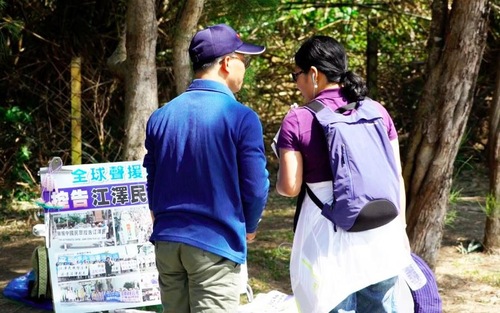 Mr. Zheng Tonghe (left) tells a tourist about Falun Gong and the persecution.
Mr. Zheng Tonghe (left) tells a tourist about Falun Gong and the persecution.
Mr. Zheng Tonghe goes to Eluanbi on the weekends. He once met a tour guide who told him how a kind practitioner had changed his attitude about Falun Gong. The guide had believed the CCP's propaganda and was hostile toward Falun Gong practitioners, who he thought had a political agenda. He would not allow his tourists from China to take fliers from practitioners or look at their posters.
One day one of his customers went missing and he was worried sick. He ran around aimlessly trying to find him. A practitioner saw him and, after hearing what had happened, immediately volunteered to take him to look for the missing tourist on his scooter. They traveled all over the mountainous area and eventually found the tourist in a remote spot. From then on, the guide had a different outlook on Falun Gong.
Mr. Zheng also befriended a Chinese tourist who agreed that the CCP was evil but still believed its propaganda about Falun Gong. The tourist also thought that practitioners had some kind of political agenda. Mr. Zheng shared his understanding of the CCP’s history and how it had killed so many Chinese people during its campaigns. In the end, the tourist understood the practitioner’s good intentions. He quit the Young Pioneers (a communist organization for youths) and befriended the practitioner. He gave the practitioner his phone number and said he wanted him to visit him.
Tour Guide Changes His Mind
Ms. Chen Lihui and Mr. Huang Lixin go to Eluanbi once a week. They want to tell Chinese tourists all the key details about the ongoing persecution in China. Ms. Chen once tried to talk to a tour guide, but the guide signaled for her to leave him alone. Ms. Chen didn’t mind and spoke softly as she handed him a newspaper. “You may want to read a newspaper from Taiwan when you take a break,” she said. The guide took the paper and said, “You are quite persistent and not leaving me alone… I see [practitioners] in many scenic spots in Taiwan. Aren’t you tired? What are you working on?”
“We are working on letting you know the truth,” Ms. Chen said. “The CCP slanders Falun Gong with its lies, and there isn’t any factual information in China because of online censorship. Falun Gong is a Buddhist practice, and its practitioners live by the principles of Truthfulness-Compassion-Forbearance. You should listen and find out more since you are outside of China,” Ms. Chen said.
After understanding the truth, the guide said, “Now that I know what Falun Gong is, I won’t stop my customers from taking your fliers or listening to the truth.”
Sincere Hearts in the Heat
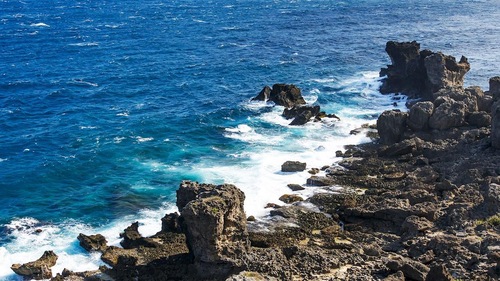 Maobitou is one of the most well-known scenic spots in Kenting because of a rock formation that resembles a cat looking into the ocean (far right).
Maobitou is one of the most well-known scenic spots in Kenting because of a rock formation that resembles a cat looking into the ocean (far right).
Maobitou is one of the most well-known scenic spots in Kenting. It is named after a rock formation that resembles a crouching cat. “Mao” means cat, and “bitou” literally means the tip of the nose but also refers to a headland.
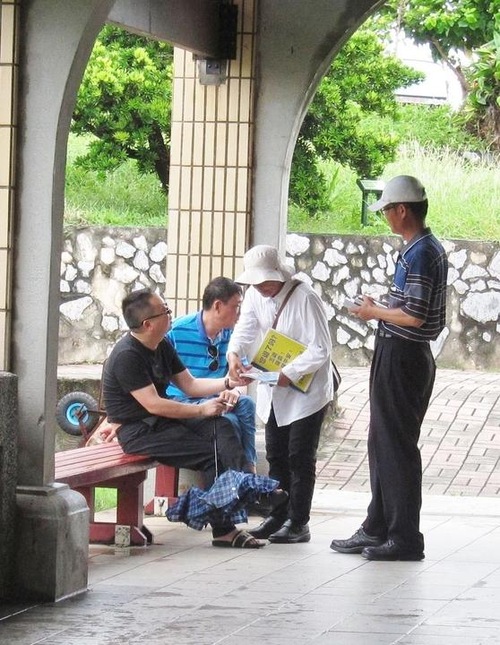 Falun Gong practitioners tell tourists in Maobitou about the practice and the persecution.
Falun Gong practitioners tell tourists in Maobitou about the practice and the persecution.
Upon learning that practitioners in China were being tortured in the persecution, Ms. Li Yanqiu was spurred to take action. “I am healthy and blessed because of the practice,” she said. “It is my honor to be able to help others understand what Falun Gong is in order to end the persecution.”
Ms. Li has been coming to Maobitou for years to talk to tourists. She understands that mainland Chinese tend to have some barriers that one has to break through when pointing out the evil nature of the CCP.
“The Chinese people can’t separate the idea of loving the country of China and loving the CCP. To show their patriotism, they listen to the CCP and support the persecution.”
Ms. Li believes that she is doing something that every practitioner wants to do. She often faces hostile individuals from mainland China, and she tries to change their minds about Falun Gong.
She recalled how she was insulted and attacked by members of a pro-Beijing group when she was in Hong Kong clarifying the truth. A local resident helped her and showed his support for Falun Gong by calling out in her defense. It moved her and boosted her confidence when it comes to facing irrational people. “Those who know the truth will help spread it, too,” she said.
There aren’t many trees in Maobitou to provide cover from the scorching sun during southern Taiwan's long summer months. With temperatures close to 100°F, sometimes Ms. Li Fanghua has felt like giving up, but she always changes her mind when she thinks of those people who have been misled by the CCP’s lies. She tells herself that she shouldn’t slack off and that “a sincere heart can bring people closer.”
Chinese tourists have started listening to her tell them about the persecution and take materials from her, so no matter what the weather, she feels content and happy.




